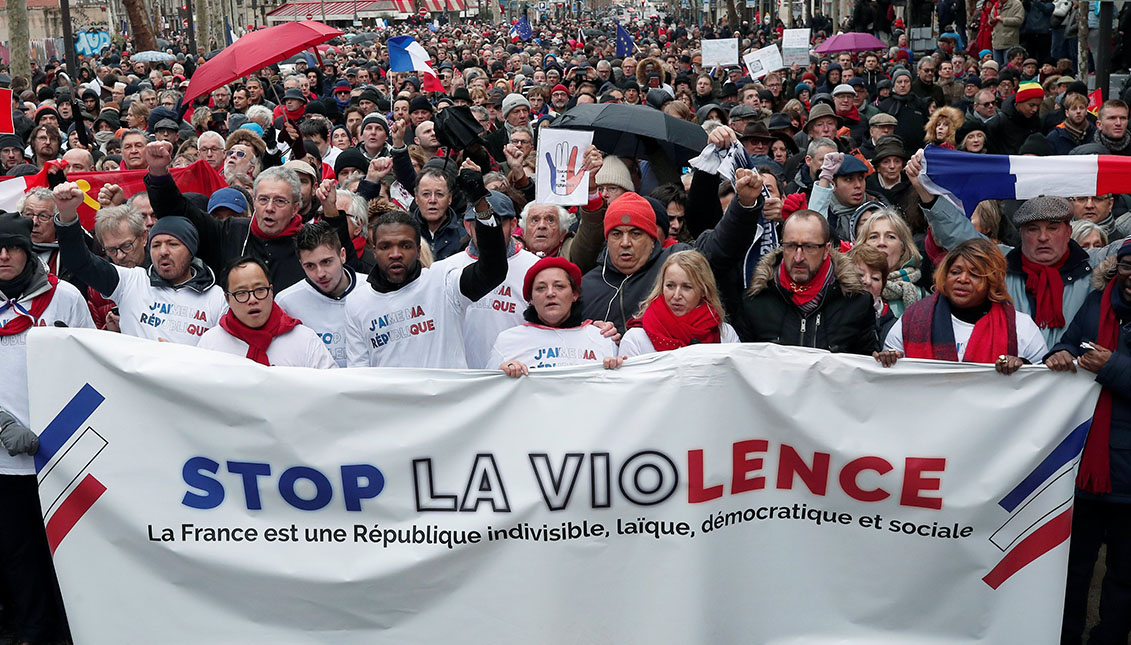
The Fight Against Police Racism Extends to France After a Music Producer is Beaten
Michel Zecler was beaten up and denied his rights in front of a judge. Now, a recording of his attack by police has shocked the entire country and fueled the…
Michel Zecler is not the only person who loses track of his mask and react when he sees the police. The difference on this occasion was his skin color, apparently enough reason for four police officers to follow him into the studio where he was taking shelter and beat him up with racist insults, punches and death threats.
He was then brought before the judge and accused of beating them and attempting to steal their weapons, for which the prosecution opened proceedings for "violence against a person in authority" and "rebellion" — a paradoxical situation of asymmetrical power that may remind some of countless police abuses. But like in other cases that had the most impact, this one was also recorded.
On Sunday, Nov. 29, lawyers handed over the contents of recording cameras to the public prosecutor's office, which were leaked all over France and forced the president to react. In the harsh video, Zecler can be seen receiving kicks, knees and punches without resisting or showing violent gestures. A fourth agent, also filmed, threw a smoke grenade into the interior of Zecler's studio before dragging him out.
French President Emmanuel Macron responded with shock on social media.
"France must never allow hate or racism to flourish," he wrote.
RELATED CONTENT
He then called on the Minister of the Interior, Gérald Darmanin, who announced four-month suspensions for the accused officers on charges of "soiling" the police but, more specifically, for "violence" and "falsification."
Les images que nous avons tous vues de l’agression de Michel Zecler sont inacceptables. Elles nous font honte. La France ne doit jamais se résoudre à la violence ou la brutalité, d’où qu’elles viennent. La France ne doit jamais laisser prospérer la haine ou le racisme.
— Emmanuel Macron (@EmmanuelMacron) November 27, 2020
The reality is that situations of police violence against populations of color are a global constant from which France is far from escaping. Not only does it present urban planning and integration problems, but also confronts the threat of terrorism with the extremist face of racism. What is surprising on this occasion is that there has been a state reaction, which can only be explained by an issue of public pressure following worldwide Black Lives Matter demonstrations that brought to the spotlight large numbers of homicides and aggressions by law enforcement officers.
Such a debate was the cruelest of a global problem of a state's power maintained through violence against innocent individuals. The dynamic is part of the battle against racist and supremacy movements and was the issue behind the U.S. move to "Defund the Police." Similar movements have since sprung across the globe.
Specifically in France, it has found a powerful echo and gap in the media agenda by coinciding with a new security law that seemed to row in the opposite direction of popular demands. It prohibits the dissemination of police images, precisely the citizen's tool used as self-defense in many recent cases, and would even allow citizens to be filmed with drones. Prime Minister, Jean Castex, announced an independent commission and denied that there were any police problems. However, according to sociologist Fabien Jobard for RTVE, "France has a structural problem of violence, no country in Western Europe has such a big police problem."










LEAVE A COMMENT: